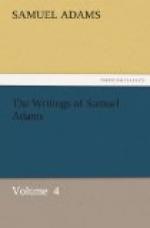Your affectionate Friend
& very humble Servant,
1 Cf. page 54.
TO JOHN WINTHROP.
[Ms., Samuel Adams Papers, Lenox Library.]
PHILAD Decr 21 1778
MY DEAR SIR
Your obliging Letter of the [9th] of November was deliverd to me by Mr Temple immediately after his Arrival here. I must candidly confess that when the Gentleman informd me by his Letter dated in New York, of his Intention then to pay a Visit to this City, I was disagreably impressd with it, and interrested my self, as far as I could do it with Decency, to prevent it. A certain Dr Berkenhout was here at that Time. He had formerly been a fellow Student with Dr Lee in Edinburgh; and although he brought no Letters from him, he made an Advantage of the old Connection, and addressd himself to Richard Henry Lee Esqr, the Doctors Brother & a Member of Congress, who from the Beginning of our Contest has been exceedingly obnoxious to our Enemies from his firm & invariable Attachment to our Cause. Dr Berkenhout was put into Prison by the Authority of this State on Suspicion, and afterwards dischargd for Want of Evidence against him. Perhaps he sufferd the more, from a certain Set of Men for valueing himself on Colo Lee; and the Colo himself has since sufferd the Reproach of an angry Writer and disappointed Man, for shewing Civility to a Person who was once acquainted with his Brother. So true is the Observation I have somewhere met with, that a Man hardly ever speaks with another, but sooner or later he finds that he has receivd Good or Harm from it.
Had Mr Temple arrivd at that Juncture, I do verily believe he would have shared the Fate of Berkenhout. And the Testimonials he has since brought with him, added to the warm Recommendations of some of my most virtuous and honorable Fellow Citizens have not been sufficient to obtain for him a welcome Reception. The Time & Manner of his leaving England, the Company he came with and the favorable Treatment he met with in New York, were judgd to be Grounds of Suspicion which more than balanced the Recommendations of his Friends & Countrymen, who, though acknowledgd to be very respectable, it was supposd, might possibly be partial in their Judgments of him. His Connections in Boston, & the Character he had sustaind there before he left that Place, it was said, made him the fittest Instrument to carry into Effect the Purposes of the British Ministers. The honest and zealous Whigs clamord against him because they imagind him to be a British Emissary; and the artful Tories, who would cordially receive such a Character into the Bosom of their Councils, if they could be sure of keeping him among themselves, joynd in the Clamor, either because they believd him to be a true American, or, if they judged him to be a Spy, as they pretended, they did not chuse to trust him in the Hands of those who might




